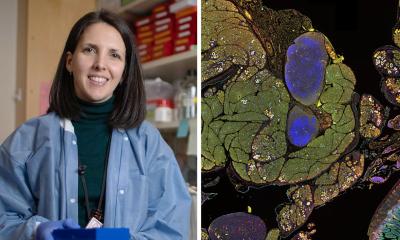News • Patient involvement enables research
Tumor vesicles as a promising biomarker for early cancer detection
Researchers from Leiden University Medical Center (LUMC), Amsterdam UMC, the University of Copenhagen and the Oncode Institute have developed a new method to detect microscopic particles shed by cancer cells.

Image source: LUMC; credit: Oncode Institute
This study, published in the Journal of Extracellular Vesicles, stands out for two key reasons, the researchers say: for one, the identification of a sugar coating that is uniquely expressed on tumor vesicles, and secondly, because of the incorporation of direct input from cancer patients. These tumor vesicles may serve as early indicators of cancer and help monitor the effectiveness of treatments.
All cells in our body release tiny droplets. These contain material from within the cell and help cells ‘communicate’ with one another or get rid of waste. Tumor cells also release similar droplets. Researchers call these "tumor vesicles." By studying them, scientists can learn more about cancer. For a long time, distinguishing tumor vesicles from those released by healthy cells has been challenging due to the lack of tumor-specific markers that can reliably tell them apart.
Under the leadership of Dr. Ir. Agustin Enciso-Martinez, researchers have discovered that tumor vesicles carry a cancer-specific sugar coating. By tagging this layer with a fluorescent protein, they are able to make tumor vesicles visible and identify them. This method has proven successful in both laboratory cell cultures and blood samples from people with pancreatic cancer. The discovery offers other scientists a new way to detect tumor vesicles and gather early information about developing tumors.
Dr. Enciso-Martinez believes it is important to involve patients in scientific research. “By engaging with patients, we gain a deeper understanding of what truly matters to them. Their experiences give us new insights and help align our research more closely with their needs,” he says. That collaboration also sparks new ideas among researchers. Enciso-Martinez adds, “We receive valuable input on how to communicate our work and convey its significance. Both are especially helpful when applying for funding.”

Image source: LUMC; credit: Oncode Institute
One of the patients involved is Carolien Hovenier, who has been working with Enciso-Martinez for some time. “Pancreatic cancer is one of the deadliest forms of cancer because it is almost always discovered at a very late stage. An earlier diagnosis can increase the chances of survival. Making the tumor vesicles visible is an important first step in that process.”
Enciso-Martinez fully agrees. “This technique opens the door to new possibilities. We’ll now investigate whether it can detect pancreatic cancer at an earlier stage, with the potential to broaden its application to other cancers, including ovarian and colorectal. Patient input has helped shape our research, for example by pointing out that collecting blood or urine is less invasive than tissue samples and better suited for ongoing monitoring. By actively engaging with patients, their insights will continue to serve as a compass for developing approaches that are meaningful in practice.”
Source: LUMC/Oncode Institute
04.08.2025





